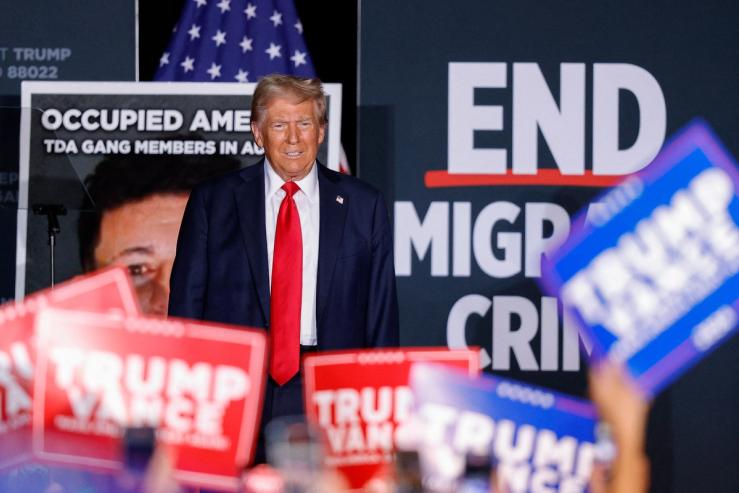The News
Donald Trump’s push to use an 18th-century law to “target and dismantle every migrant criminal network operating on American soil,” as he said in Aurora, Colorado last week, might not be easy to actually implement.
The former president referenced the 226-year-old law, called the Alien Enemies Act of 1798, as part of an initiative aimed at migrant gangs that he’s calling “Operation Aurora.” On Tuesday, Trump also floated using the law as a way to end all sanctuary cities during a town hall with Fox News’ Harris Faulkner.
“I’ll have to do it with an executive order,” he told Faulkner. “You can do it with the Aliens Act of 1798. We can do things in terms of moving people out. We can move them out of the sanctuary cities.”
The Alien Enemies Act has been tapped sparingly throughout history: During the War of 1812, World War I, and most notoriously in World War II, when it was used as part of Japanese internment policies. The law states that a president can invoke the act when “there is a declared war between the United States and any foreign nation or government, or any invasion or predatory incursion is perpetrated, attempted, or threatened against the territory of the United States by any foreign nation or government.”
George Fishman, a senior legal fellow at the Center for Immigration Studies who previously served in the Trump administration and has written about this topic, cited the law’s written definition as the “main potential roadblocks” to successfully implementing it should he win the presidency.
“For many decades — hundreds of years — the Supreme Court has upheld the constitutionality of the Alien Enemies Act and the detention and the removal under the Alien Enemies Act, but that’s always been in the context of declared wars,” Fishman said.
Trump could try to make the case that “the acts of a particular transnational criminal gang” are effectively also the acts of a foreign government, he suggested. But that would require a careful case-by-case approach, not the kind of broad approach the president has indicated.
Katherine Yon Ebright, counsel in the Brennan Center’s Library and National Security Program, also expressed skepticism that Trump would be able to use the Alien Enemies Act, describing it as a clear “wartime authority” acknowledged by both “the Supreme Court and past presidents.” Politicians’ alternative readings of the law, she argued in a recent piece, are “at odds with centuries of legislative, presidential, and judicial practice.”
Still, Ebright noted that two past presidents continued using the law after it was invoked amid “major conflicts,” adding that presidents often have broad latitude on national security questions from courts. But it’s at least possible that they might be reluctant about “second guessing the president” on questions like whether gang activity is tied to a foreign “invasion” or hostile government, she said.
In this article:
Shelby’s view
The Trump campaign has always viewed immigration as one of the big winning topics for them against any Democrat, and they’ve only leaned into it further in the weeks leading up to election night. Trump has already promised “mass deportation” — which could come with its own legal and logistical hurdles — and his new focus on the Alien Enemies Act provides a more specific glimpse into how he might try and implement his broader plan. Actually utilizing it may be a long shot, but he’ll likely have a more experienced team around him if he wins a second time around who have spent the interim years wargaming new legal tactics and will likely be more aggressive about pushing boundaries.
Room for Disagreement
David Leopold, a partner at UB Greensfelder who focuses on immigration practice, told Semafor that the concerns about Trump implementing the Alien Enemies Act should go beyond the current legal reading.
“In the first term there were folks in the room that put some guardrails on him,” Leopold said. “He’s going to have the white-nationalist sycophants…egging him on.”
Notable
- During an appearance on The Breakfast Club this week, Kamala Harris responded to a listener concerned the law could be used against racial minorities. “He is achieving his intended effect: To make you scared,” Harris said.
- Ilhan Omar has pushed for repealing the Alien Enemies Act, describing it in 2021 as a “xenophobic law” that is “dangerous and must be taken off the books.”


